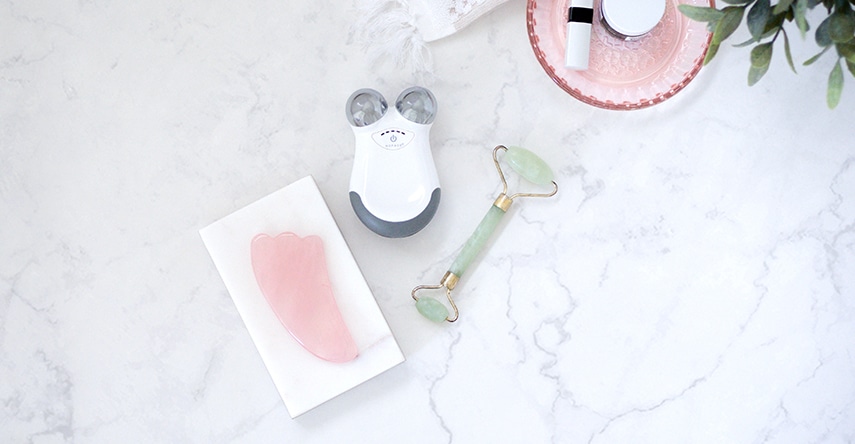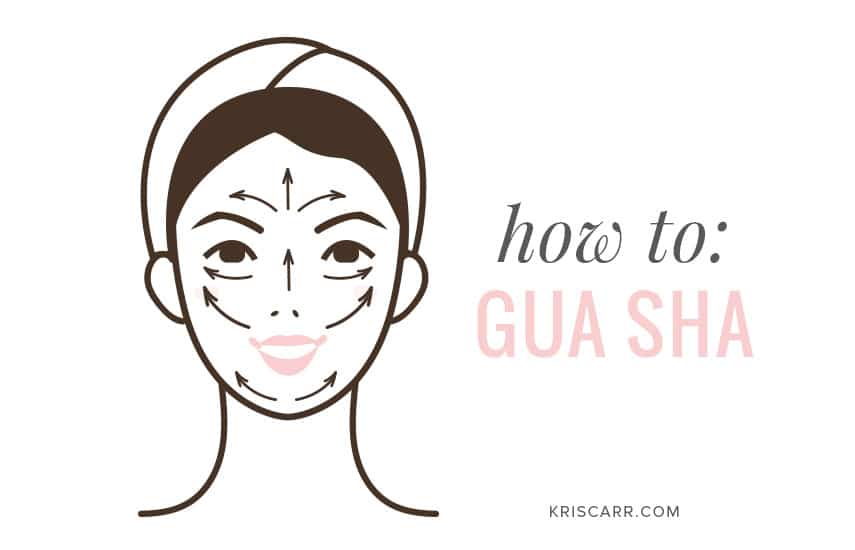Hiya Gorgeous!
The beauty world is constantly evolving. We’re introduced to new products and techniques practically everyday—many promising to be the next life-changing solution to our beauty woes. But with all of the options out there, it can be hard to separate the gems from the duds. So, the more I heard about the impressive benefits of facial massage, the more I had to look into it.
That’s why I’m so grateful for our incredible Beauty Editor, Danielle Shine! Not only is she super smart and well-versed on all things beauty and skincare—she’s also studying nutrition, which means she really understands the science behind how we take care of ourselves.
So needless to say, the first time I saw Danielle rolling a wacky little device all over her face on Instagram, I couldn’t wait to ask her to write about it. And as usual, she’s totally outdone herself. She became a facial massage detective—uncovering the most effective techniques and tools, plus the types of benefits you can expect to see.
Keep reading to find out which facial massage method meets your skincare needs.
Take it away, Danielle!
3 Must-Have Facial Massage Tools and Techniques
by Beauty Editor Danielle Shine
Thanks, Kris!
For the last 6 months I’ve been trialing facial massage tools and techniques in a bid to better understand how they work and what benefits they promote.
Happily, I’ve discovered you can totally do it at home for a LOT less—here’s what I found after throwing myself head-first (pun intended) into the fantastic field of facial massage…
Gua Sha
It all began with Mae, my Chinese next-door neighbor. I was 15, she was 35, but looked a lot younger. Her skin looked like porcelain—so clean, clear and radiant.
Most days after school, I’d drop in to say “hi” to Mae. I didn’t realize at the time, but she’d save her beauty routine for when I was there—it became our thing. I’d perch on the toilet seat in her bathroom chatting away while Mae performed her curious facial massage routine with a flat, green stone she called “jade.”
She’d swipe it across specific sections of her face, finishing up by slapping and pinching areas around her chin, cheeks and forehead—it was the funniest thing to watch! Little did I know this routine would eventually become one of hottest facial massage trends across the globe: gua sha.
How does gua sha work?
Gua sha (pronounced “gwa sha”) is a traditional non-needle healing technique involving pressure-based strokes performed all over the body with a flat-edged instrument to intentionally raise petechiae, which are tiny red or purple spots under the skin caused by minor bleeding from broken capillaries.
Sounds brutal, but scientific research supports gua sha’s many benefits, the main one being improved blood and Qi (energy) flow to body tissues. When blood flows efficiently throughout the body, circulation is improved and lymphatic fluid moves more optimally to promote faster, more effective regeneration, protection and repair of cells.
When it comes to gua sha facial massage, it’s important to note that you must apply fairly light pressure to avoid bruising or permanently damaging the many more delicate capillaries beneath your skin.
When performed gently and correctly, gua sha facial massage helps:
- Lift sagging skin around eyes, jawline and neck
- Reduce or eliminate puffiness (pockets of fluid under skin)
- Minimize the look of fine lines and wrinkles
- Reduce recurrence of inflammatory symptoms like pimples (especially when paired with a diet filled with real, fresh food!)
- Brighten complexion
Is gua sha worth my money?
Yes. Especially compared to the oh-so-hot-right-now jade rollers, which work nicely to cool and soothe the skin, but don’t affect the same blood and lymph flow or tension-release, gua sha facial massage can.
Interested? Start by with something like this and incorporate gua sha during your morning or nighttime routine with a little facial oil. Despite what some say, there’s really no one way to use gua sha. I have met some of the best Chinese Medicine facialists in the world and each time they demonstrate a different style or technique.
The main safety bits you need to know: Be gentle and avoid your delicate eye area entirely, (the super-soft part of your eye sockets). Oh! And safeguard your thyroid by never ever using gua sha over the top of your throat.
My favorite technique is one that shifts and drains fluid first thing in the morning—it’s great for de-puffing. Always use the flat edge of your tool and stroke upwards in a light sweeping motion using the graphic below as a guide. Three to five times for each stroke is all you need. As you become more confident and figure out what type of pressure works for you, you should see a little red flush appear after the third or fourth stroke. As long as there is no pain, you’re doing it correctly. I do this daily just before brushing my teeth, but make it work for you!
Handheld Facial Massage Rollers
After MUCH trial and research, it’s safe to say I’m now addicted to handheld facial massage tools. It’s become a daily thing for me—well, more like a several-times-a-day thing because it’s feels so good! I use it during university lectures, Skype conversations, when I’m on the toilet (don’t knock it ‘til you try it!) and I’ve even been known to whip it out my after dinner.
You’ll come to understand all of this once you try it for yourself. In fact, I challenge you NOT to enjoy this terrific treat!
How do facial massage rollers work?
Pretty simple really: With one hand, apply moderate pressure as you roll the tool over the main areas of your face, avoiding your eye area. Think: cheeks, chin, jawline and forehead. You can also massage the sides of your neck, but never ever over your throat where your thyroid lives—this advice stands for any kind of massage tool or technique.
When used correctly, facial massage rollers can:
- Stimulate facial circulation
- Plump skin, reducing the appearance of fine lines and wrinkles
- Support lymph drainage
- Help tighten skin
- Reduce puffiness due to excess fluid
- Support clearance of nasal and sinus congestion
Are facial massage rollers worth my money?
Abso-freaking-lutely! Similar to body massage, handheld facial massagers work under whatever pressure you decide to apply to effectively loosen super-tight spots and support circulation. After just 3 months of use, my terribly tight jaw (I unconsciously clench during sleep and stressful times) feels SO much better. I’ve also stopped grinding my teeth during sleep which is an amazing, unexpected result.
Here are three of my fave facial massage rollers:
The Facialift (approx. $55 USD)
You’re welcome. One trial of this magical tool will have you agreeing it’s a never-leave-home-without-it thing. Designed by London’s most sought-after skin specialist, Sarah Chapman (a pure genius in my opinion), the Facialift has improved saggy areas around my mouth (think inside-out dimples) PLUS it also alleviates major tension around my jawline and neck after long days of university study.
Jeanne Piaubert Stimuloval Roller (approx. $45 USD)
A little smaller and not as effective as the Facialift, this little roller is still a great addition to your beauty facial massage routine. The soft, small plastic spikes don’t pierce the skin, so I love using it to get at the tricky little crease-prone area between your eyebrows (where botox is often first deployed). I also love rolling it along my forehead to get blood moving. Every time I use it, I notice some of my deeper creases appear lighter!
Mauli Rituals Anti-aging Massage Dome (approx. $83 USD)
Just delightful! This tension-release massage tool is deeply rooted in Ayurvedic history. Designed to gently lift, sculpt and smooth your skin, it’s a sweet little addition to your beauty toolbox. I use it mostly when my face feels puffy.
Microcurrent Stimulation
Possibly the MOST fun I’ve had in all my years of natural beauty experimentation thus far, this really works! But, like all of these tools and techniques I’ve shared with you here, microcurrent stimulation produces short term results—it’s something you really must incorporate into your daily or weekly routine to see real, consistent change. No big deal really, I factor in a little microstimulation before or after brushing my teeth most days. Easy peasy!
How does microcurrent stimulation work?
Did you know that there are forty-three muscles in your face? Well, science says that microcurrent stimulation (originally developed to support facial palsy and other muscular issues) can “wake them up” by delivering a safe, low-dose current that reminds muscles of where they used to be before gravity took hold.
When microcurrent stimulation is used consistently over time, muscles become a little tighter thanks in part to increased blood and lymph circulation (do you see a pattern here?), which helps muscles resume their original place. Try it to experience benefits such as:
- Tighter skin
- Minimization of fine lines and wrinkles
- Plumper, fresher-looking (and feeling!) skin
- Less facial sagging (if used routinely, obvi!)
Is microcurrent stimulation worth my money?
Yes, but start with a visit to your local esthetician to get a feel for what microcurrent stimulation is like before you invest in your own at-home device like this one.
Be aware that you will feel some kind of stimulation—it’s different for everyone, but just know that in NO way is it meant to feel painful. Think more tingly, prickly feels depending upon your sensitivity level.
For those of you who need further info, scientific research says it’s completely safe when used for short periods of time: 10-15 minutes will do the (tightening) trick. You can do it two to three times a week (or more if you like, but always give yourself at least 24 hours between treatments) to maintain the lovely lifted look!
Ok my friend, that’s it!
We’ve come to the end of the facial massage and rolling road for now, but before I sign off I want to encourage you to try at least one of the methods I’ve detailed above. It’s a great way to practice self-care and get that feel-good factor in the comfort of your own home for a LOT less than your standard facial. I mean, there’s really nothing better than being able to take care of yo’self with a side of toned facial muscles and de-puffed skin thanks to these terrific tools that last a lifetime.
And with that said, I’m off to take a bath and give myself a little facial massage while I’m at it because that’s just how I roll…
Thanks, Danielle! I’m so excited to try out some of these techniques and tools for myself.
Like Danielle said, facial massage is a great practice to add to your self-care routine. It may seem small, but every little thing we do to take care of ourselves has the power to uplift our spirits. It’s about sending yourself the message that you’re worthy, because you are!
Your turn: Have you tried any of these facial massage techniques? If so, we’d love to hear what you thought! If not, which would you like to try?
Peace and happy faces,




How does the face tool work?
Hi there! Which face tool are you asking about specifically in this article?
I’m trying to incorporate both Gua Sha and microcurrent facials into my routine. I was wondering how often can/should both be performed, and if they can be performed on the same day? If so, which would you recommend doing first?
It’s up to you which you would like to do first. Check with your esthetician to see what the best routine is for your personal skin needs.
Nice!Really an amazing post. Very helpful to brighten up the skin and to maintain healthy skin.